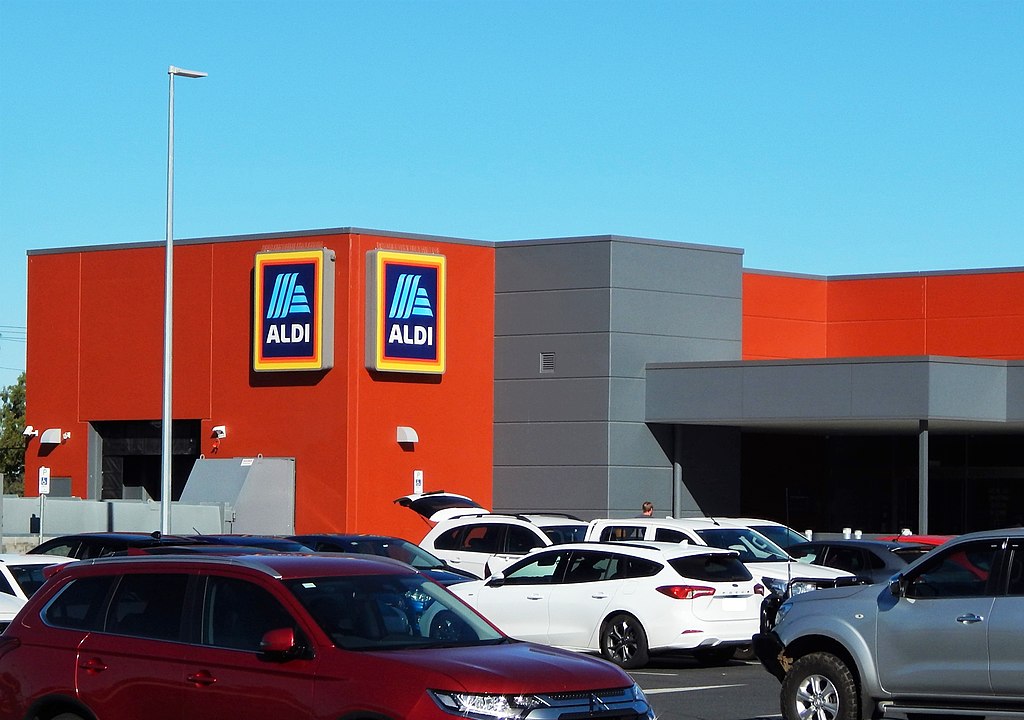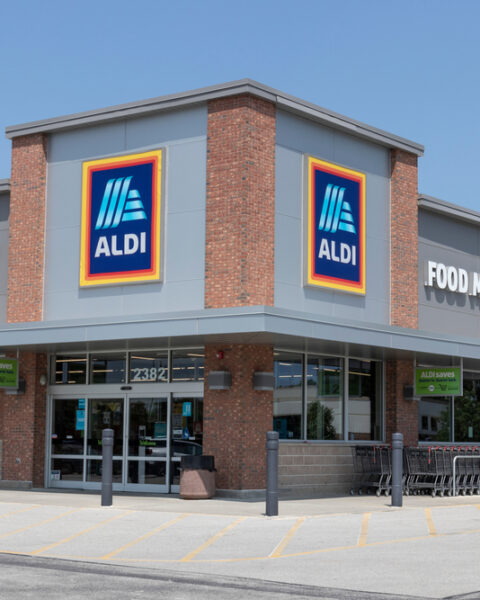In 2022, Aldi was named the fastest-growing supermarket retailer in the US, opening almost fifty new stores over the course of the year.
As this German-based grocery chain gains more and more popularity, people are starting to wonder… how is Aldi growing so fast, and how are they keeping their prices so low while they do it?
Today, we’ll dig into the long list of ways that Aldi saves money to bring the lowest prices possible to their shoppers.

10 Ways Aldi Keeps Prices Low
1. Aldi avoids stocking name brands (and when they do, it’s overstock)
The first thing you’ll notice when you start browsing Aldi’s shelves is that they don’t stock many recognizable brands. Instead, you’ll find Aldi store brands like “Specially Selected” and “PurAqua.”
When you do spot a name-brand item on the shelf at Aldi, you can almost guarantee this is an overstock item that Aldi got at a discount.
By avoiding brand names and only stocking them when they can get a good deal, Aldi saves a ton of money on the products they sell and passes these savings on to their consumers.
2. Aldi stores are relatively small with limited locations worldwide
As of 2023, there are just over 2,000 Aldi stores across the entire US, making them feel exclusive and driving their popularity. This keeps demand for Aldi products high while Aldi can keep their overhead operation costs relatively low.
Aldi stores also have a smaller footprint (literally) than many other major grocery retailers, meaning that their rent and building operation costs are relatively low.
With fewer locations and smaller stores, Aldi cuts down big time on their overhead costs.
3. They buy in bulk from allied vendors who offer them lower prices
Instead of buying from name-brand wholesalers, Aldi has trusted relationships with a group of allied vendors who consistently offer Aldi low prices on bulk products.
This is why Aldi finds are often here one day and gone the next. Aldi is offered a good deal on one batch of something, so they buy it, sell it off, and then they wait for the next great deal to come along.
Aldi doesn’t have to negotiate for an unlimited supply of any one product since their customers know not to expect the same items on the shelves from week to week.
4. They limit unnecessary positions at their stores
Another way Aldi saves money is by keeping their workforce relatively small and only hiring people to fill necessary positions. For example, you won’t see Aldi employees solely tasked with bagging groceries or retrieving shopping carts from the parking lot.
Instead, Aldi expects their customers to participate in their shopping experience. Shoppers bag their own groceries and return their own carts using a clever cart rental system.
To rent a cart at Aldi, you simply drop a quarter into the cart rental lock system. The lock releases your cart which you can then use as you shop. Then, when you’re done, you can get your quarter back by returning your cart. This eliminates the need for cart retrieval and helps foster efficiency.
By cutting down on labor costs, Aldi saves a big chunk of change each year.
5. They limit their store hours to cut down on labor and operation costs
While many popular grocery stores like Walmart and Kroger are known for being open from dawn into the wee hours of the night, Aldi limits their hours to just 11 hours per day. While store hours may vary by location, most Aldi stores open at 9 AM and close at 8 PM.
By limiting their opening hours, Aldi not only saves on labor costs, but they also save on electricity and other utilities associated with being open.
6. They’ve eliminated unnecessary supply costs on shopping bags
While it’s pretty unheard of at major grocery chains, Aldi doesn’t give out grocery bags to their customers. It’s not that you have to pay extra for a bag either. They just don’t have bags, period.
Instead, Aldi shoppers are expected to bring their own bags from home or grab a reusable cardboard box by the door when they arrive.
By limiting the money they spend on unnecessary supplies, Aldi not only cuts down on their contribution to waste, but they also save a ton of money in the process.
7. They don’t splurge on unnecessary signage or decorations
Another way that Aldi cuts down on unnecessary costs is by limiting the amount of signage and decorations they use in their stores.
Aldi stores are known for looking a little stark and utilitarian. This isn’t because Aldi doesn’t care about its customers–it’s because they’d rather offer lower prices than spend unnecessary money on fancy signs and colorful murals in their stores.
It’s also interesting to note that Aldi originated in northern Europe where it’s a lot more common to see plain store interiors. This might explain the German grocer’s approach to store aesthetics.
8. They under order to keep costs low and demand high
If one thing can be said about Aldi’s business model, it’s that they’ve mastered the art of manufacturing high demand.
Instead of keeping their stores stocked with all of their customers favorite items all the time, Aldi buys their products in limited quantities and doesn’t sweat it when an item runs out.
By doing this, customers develop an excitement for when (if ever) that product might become available again. The suspense keeps Aldi shoppers coming back each week, and the limited inventory saves Aldi money on purchase costs.
9. They don’t overspend on advertising or technology
While you’re probably used to seeing elaborate ads for stores like Target and Walmart everywhere from YouTube to Hulu to regular old TV, Aldi doesn’t spend much on digital advertising. Instead, they rely mostly on word of mouth, strategic store placement, and other forms of organic advertising. This saves Aldi massive amounts of money in their budget each year. And so far, their approach seems to be working.
You also may have noticed that Aldi doesn’t have the fanciest website in the world. This is just one other way that Aldi reduces their investment on what they see as unnecessary luxuries like having a high-tech webpage. Maybe Aldi will change its approach in the future, but so far it seems like their method of keeping costs to a bare minimum is really working for them.
10. Energy efficient stores reduce electricity costs
Last but not least, Aldi keeps their operation costs low by building energy efficient stores. Each Aldi store is rated with a high level of energy efficiency, meaning that they pay as little as possible on their lighting and heating bills. Not only does this save Aldi money, but it’s also better for the environment.
This might be another sign of Aldi being a company from northern Europe, where innovative energy technologies are a bit further ahead than they are here in the US.






